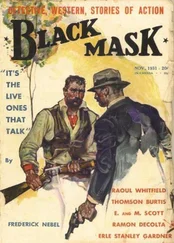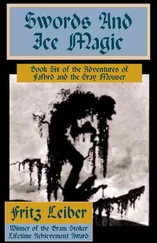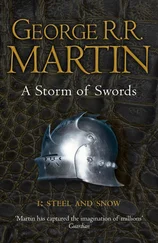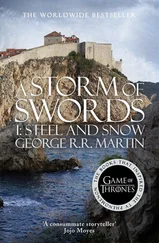And, true, this appeared to solve the problem of seepage, for the time being, the peat acting both as a dam and serving to absorb much of the rot. But it did nothing whatsoever to deter the cats and dogs milling about the square, or the raucous cloud of birds that had begun to swoop in, snatching mouthfuls of flesh, before they could be chased away by the two sentries, who shouted at them and brandished brooms and long wooden poles.
Inside the smoky warmth of the tavern—which, by the way, was known as the Cod’s Demise, though no sign had ever born that title—Malmury knew nothing of the trouble and worry her trophy was causing in the square, or the talk of having the troll hauled back into the marshes. But neither was she any longer precisely carefree, despite her drunkenness. Even as the sun was rising over the village and peat was being stacked about the corpse, a stooped and toothless old crone of a woman had entered the Cod’s Demise. All those who’d been enjoying the tale’s new wrinkle of a fire-breathing worm, turned towards her. Not a few of them uttered prayers and clutched tightly to the fetishes they carried against the evil eye and all manner of sorcery and malevolent spirits. The crone stood near the doorway, and she leveled a long, crooked finger at Malmury.
“Her,” she said ominously, in a voice that was not unlike low tide swishing about rocks and rubbery heaps of bladder rack. “She is the stranger? The one who has murdered the troll who for so long called the bay his home?”
There was a brief silence, as eyes drifted from the crone to Malmury, who was blinking and peering through a haze of alcohol and smoke, trying to get a better view of the frail, hunched woman.
“That I am,” Malmury said at last, confused by this latest arrival and the way the people of Invergó appeared to fear her. Malmury tried to stand, then thought better of it and stayed in her seat by the hearth, where there was less chance of tipping over.
“Then she’s the one I’ve come to see,” said the crone, who seemed less like a living, breathing woman and more like something assembled from bundles of twigs and scraps of leather, sloppily held together with twine, rope, and sinew. She leaned on a gnarled cane, though it was difficult to be sure if the cane was wood or bone, or some skillful amalgam of the two. “She’s the interloper who has doomed this village and all those who dwell here.”
Malmury, confused and growing angry, rubbed at her eyes, starting to think this was surely nothing more than an unpleasant dream, born of too much drink and the boiled mutton and cabbage she’d eaten for dinner.
“How dare you stand there and speak to me this way?” she barked back at the crone, trying hard not to slur as she spoke. “Aren’t I the one who, only five days ago, delivered this place from the depredations of that demon? Am I not the one who risked her life in the icy brine of the bay to keep these people safe?”
“ Oh, she thinks much of herself,” the crone cackled, slowly bobbing her head, as though in time to some music nobody else could hear. “Yes, she thinks herself gallant and brave and favored by the gods of her land. And who can say? Maybe she is. But she should know, this is not her land, and we have our own gods. And it is one of their children she has slain.”
Malmury sat up as straight as she could manage, which wasn’t very straight at all, and, with her sloshing cup, jabbed fiercely at the old woman. Barley wine spilled out and spattered across the toes of Malmury’s boots and the hard-packed dirt floor.
“Hag,” she snarled, “how dare you address me as though I’m not even present. If you have some quarrel with me, then let’s hear it spoken. Else, scuttle away and bother this good house no more.”
“This good house ?” the crone asked, feigning dismay as she peered into the gloom, her stooped countenance framed by the morning light coming in through the opened door. “Beg your pardon. I thought possibly I’d wandered into a rather ambitious privy hole, but that the swine had found it first.”
Malmury dropped her cup and drew her chipped dagger, which she brandished menacingly at the crone. “You will leave now, and without another insult passing across those withered lips, or we shall be presenting you to the swine for their breakfast.”
At this, the barmaid, a fair woman with blondish hair, bent close to Malmury and whispered in her ear, “Worse yet than the blasted troll, this one. Be cautious, my lady.”
Malmury looked away from the crone, and, for a long moment, stared, instead, at the barmaid. Malmury had the distinct sensation that she was missing some crucial bit of wisdom or history that would serve to make sense of the foul old woman’s intrusion and the villagers’ reactions to her. Without turning from the barmaid, Malmury furrowed her brow and again pointed at the crone with her dagger.
“This slattern?” she asked, almost laughing. “This shriveled harridan not even the most miserable of harpies would claim? I’m to fear her?”
“No,” the crone said, coming nearer now. The crowd parted to grant her passage, one or two among them stumbling in their haste to avoid the witch. “ You need not fear me, Malmury Trollbane. Not this day. But you would do well to find some ounce of sobriety and fear the consequences of your actions.”
“She’s insane,” Malmury sneered, than spat at the space of damp floor between herself and the crone. “Someone show her a mercy, and find the hag a root cellar to haunt.”
The old woman stopped and stared down at the glob of spittle, then raised her head, flared her nostrils, and fixed Malmury in her gaze.
“There was a balance here, Trollbane, an equity, decreed when my great-grandmothers were still infants swaddled in their cribs. The debt paid for a grave injustice born of the arrogance of men. A tithe, if you will, and if it cost these people a few souls now and again, or thinned their bleating flocks, it also kept them safe from that greater wrath that watches us always from the Sea at the Top of the World. But this selfsame balance have you undone, and, foolishly, they name you a hero for that deed. For their damnation and their doom.”
Malmury cursed, spat again, and tried then to rise from her chair, but was held back by her own inebriation and by the barmaid’s firm hand upon her shoulder.
The crone coughed and added a portion of her own jaundiced spittle to the floor of the tavern. “They will tell you, Trollbane, though the tales be less than half-remembered among this misbe-gotten legion of cowards and imbeciles. You ask them, they will tell you what has not yet been spoken, what was never freely uttered for fear no hero would have accepted their blood money. Do not think me the villain in this ballad they are spinning around you.”
“You would do well to leave, witch,” answered Malmury, her voice grown low and throaty, as threatful as breakers before a storm tide or the grumble of a chained hound. “They might fear you, but I do not, and I’m in an ill temper to suffer your threats and intimations.”
“Very well,” the old woman replied, and she bowed her head to Malmury, though it was clear to all that the crone’s gesture carried not one whit of respect. “So be it. But you ask them, Trollbane. You ask after the cause of the troll’s coming, and you ask after his daughter, too.”
And with that, she raised her cane, and the fumy air about her appeared to shimmer and fold back upon itself. There was a strong smell, like the scent of brimstone and of smoldering sage, and a sound, as well. Later, Malmury would not be able to decide if it was more akin to a distant thunderclap or the crackle of burning logs. And, with that, the old woman vanished, and her spit sizzled loudly upon the floor.
Читать дальше











